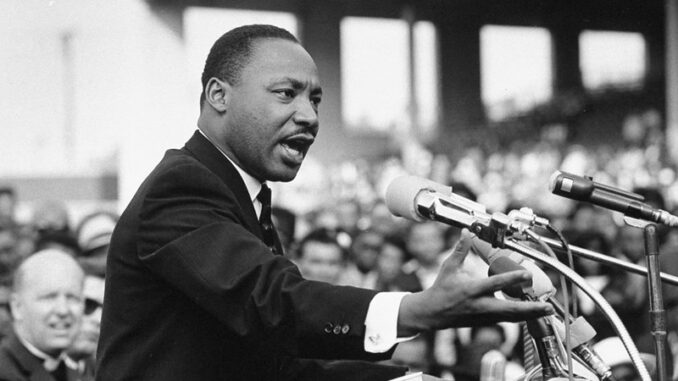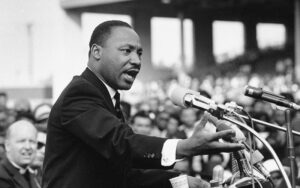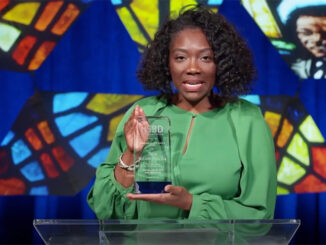

Gillian Fitzgerald | Staff Writer
01/28/2021
Racism. Say it, name it and call it what it is.
In celebration of Rev. Dr. Martin Luther King Jr., keynote speaker Charles McKinney presented “Martin Tried to Tell Us: Confronting King as the Nation Chooses Chaos over Community.” The presentation discussed the discrepancy between all that King fought for and what he’s remembered for today.
McKinney is the Neville Frierson Bryan Chair of African Studies and Associate Professor at Rhodes College in Memphis, Tennessee. He is a renowned Civil Rights Scholar who has numerous distinguished publications, and came to talk to students, faculty and professors about a simple, yet important question: “What would happen if we listened to Dr. King’s words?”
The Office of Diversity and Inclusion held several events last week honoring King’s legacy on racism, discrimination and poverty in the U.S. It ended the week on Friday with McKinney’s presentation.
In the wake of the riot in the nation’s Capitol building at the beginning of January, King’s words could have been written yesterday. They apply to American society just as much today as they did 50 years ago, as seen in King’s book “Where Do We Go From Here: Chaos or Community?”
“… A minority of whites who genuinely want authentic equality … are balanced at the other end of the pole by the unregenerate segregationists who have declared that democracy is not worth having if it involves equality,” wrote King in the book.
Yet, when the monument to violence by white extremists occurred just three weeks ago, McKinney noticed that King’s words were nowhere on television networks or connected to this insurrection. He urged the audience to think about why there is a disconnect between King and these violent images, and why King is only brought up when Black people are using violence — but not when whites are perpetrating violence.
“There’s a reason why we don’t grapple with the real King,” McKinney said. “We don’t think of King in truly, authentically expansive ways … we don’t think of King in all of his prodigious work and the way they touched on every aspect of American society.”
When people talk about King — most only honoring him once a year — who are they referencing? Unfortunately, it’s usually what social activist Julian Bond referred to as the “master narrative” that surrounds the Civil Rights Movement in our country: Once King led the protest movement, backed by the “sympathetic government,” America understood discrimination was wrong and instantly changed — it was a victory for our great country.
“It’s the history we’re taught versus the history we should know,” said Anthony Kane, the director for the Office of Diversity and Inclusion at Duquesne.
King’s monument in Washington D.C. itself has 14 of his own quotes written on it — yet not one of them contains the words racism, segregation or racial inequality.
The master narrative avoids the actual substance of King and refuses to call what he fought what it really is: racism. McKinney explained that not only is this narrative ignorantly racist, it is perpetrated even further when it is made gendered, classist and heteronormative — all while lacking accountability in society.
“So much of our issue today … is our discomfort and inability to name the thing that we are combating,” McKinney said. “We battle against evil content, but there are no evil doers: misogyny without misogynists, racism but no racists, homophobia but there’s no homophobes.”
This behavior and mindset often motivates the way America goes about interacting with the rest of the world as well. However, it brands it with the notion that our country’s actions are always right, ignoring its history of violence and poverty both inside and outside its borders.
McKinney went on to explain how this toxicity is revealed in militarism, as seen at the Capitol last month and in the way we engage in war. It results in racism and poverty going unchecked, as many people are “violently opposed to the construction of a multiracial democracy” in a nation that “manipulates the poor,” as King said.
King not only fought for a nation of equality, but also for war to be seen as an attack on the poor. He saw the connection between the breakdown of poverty programs and the buildup of war in Vietnam — something that continues to occur today because, as McKinney stated in his presentation, “perpetual war will always come at the expense of marginalized people at home and abroad.”
“Immoral behavior erodes our moral fabric when we don’t ask hard questions about the way we move in the world,” McKinney said.
The presentation discussed how King’s anti-poverty and multi-racial movement is the narrative the U.S. needs as it continues to go through another political and human rights crisis, due to the fact that Americans didn’t actually or fully listen to King in the past. It also spoke on the United States’ deep-rooted issues and educated the Duquesne community on the real purpose behind King’s words, along with how the country is reliving a time where people are choosing chaos over community.
McKinney claimed that Americans are in a position where they must continue King’s work, and he advised students to build their community, engage in freedom dreams and be bold and unrepentant in telling the truth: Call racism what it is and figure out what that looks like on campus.
“Be prepared, willing and able to engage in dialogues, meetings, and workshops … and be prepared to engage in sit ins and non-violent direct action activities when folks aren’t hearing you,” McKinney said. “Have all channels open, and then move forward in confidence that you all are engaged in what Martin King called ‘the beautiful struggle to make a new world.’”



